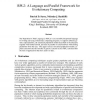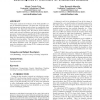11 search results - page 2 / 3 » Orgy in the Computer: Multi-Parent Reproduction in Genetic A... |
GECCO
2010
Springer
13 years 5 months ago
2010
Springer
This paper takes an economic approach to derive an evolutionary learning model based entirely on the endogenous employment of genetic operators in the service of self-interested a...
EUROGP
2008
Springer
13 years 7 months ago
2008
Springer
Abstract. Turing machines are playing an increasingly significant role in Computer Science domains such as bioinformatics. Instead of directly formulating a solution to a problem, ...
PPSN
1994
Springer
13 years 9 months ago
1994
Springer
The Reproductive Plan Language 2 (RPL2) is an extensible interpreted language for writing and using evolutionary computing programs. It supports arbitrary genetic representations,...
EC
2006
13 years 5 months ago
2006
The frequency with which various elements of the search space of a given evolutionary algorithm are sampled is affected by the family of recombination (reproduction) operators. Th...
GECCO
2006
Springer
13 years 9 months ago
2006
Springer
This paper analyzes the behavior of the XCS classifier system on imbalanced datasets. We show that XCS with standard parameter settings is quite robust to considerable class imbal...


